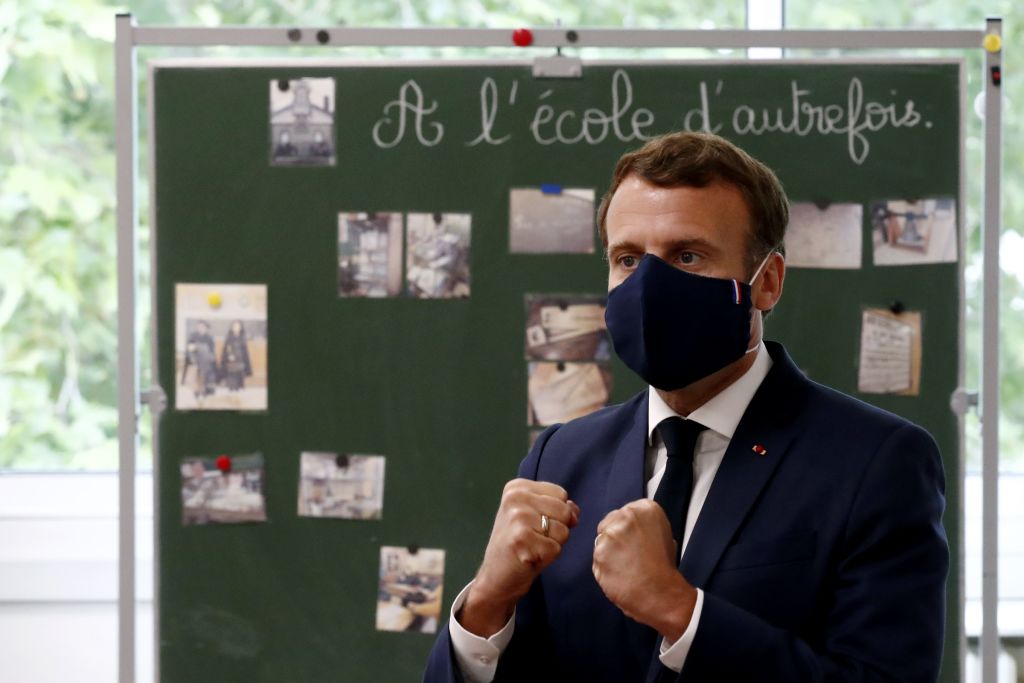Emmanuel Macron has become the pantomime villain for much of the British press after his hissy fit last week in which he questioned the efficacy of the AstraZeneca jab. It was the latest in a series of snipes at the British that has made the French president the scourge of Fleet Street. ‘Bargain-basement Bonaparte,’ was how the Daily Mail described Macron, while the Sun plumped for ‘pint-sized egomaniac’.
He’s none too popular among his own people, either, the figurehead of the French failure to be the only member of the UN Security Council incapable of producing their own vaccine. No wonder a recent opinion poll suggested Marine Le Pen is a stronger threat than ever ahead of next year’s presidential election.
But the president of France should be lauded for one triumph. When last month a winter wave of Covid led to the closure of schools in Britain, Holland, Germany, Ireland, Austria and Denmark, Macron kept French schools open. So today one of France’s three educational ‘zones’ break up for a fortnight’s half-term having enjoyed five weeks of face-to-face teaching.
The president of France should be lauded for one triumph
My 16-year-old daughter gets her hols next week. She can’t wait. Wearing a mask nine-to-five is not much fun for any self-conscious adolescent, and some of the social distancing protocols prohibit her from mixing with friends outside her class. Nonetheless she’s grateful to have had the opportunity to go to school each day, to learn, laugh and above all, get out of the house. She has nothing but pity for her cousins in England, cooped up since 5 January home schooling.
Across France, unions, teachers and parents demonstrated a fierce determination to keep the schools running in the face of a resurgence of Covid. They take their lead from the education minister, Jean-Michel Blanquer, one of the few ministers in Macron’s government who has remained in his post since May 2017. ‘Keeping schools open: it’s my profound conviction,’ he said last week. ‘To be deprived of school can be very serious for children educationally, socially, psychologically and even in terms of health.’
He hasn’t been afraid to close schools in the event of an outbreak – and last week, at least 64 schools out of 61,500 had been temporarily shut – but Blanquer has exhibited a steely resolve in steering national education through the crisis. Who can begrudge him his boast that French leads Europe in the number of schooldays offered to pupils during the pandemic?
Unlike his British counterpart, Gavin Williamson, whose background is ceramics and fireplaces, Blanquer’s working life has been devoted to education. He has worked as a lecturer and a rector. And since his appointment three-and-a-half years ago, he has been quietly overhauling an education system in need of modernisation.
He’s made enemies and friends in equal measure within the teaching profession, but none can doubt his commitment to children’s education.
One of those friends is Brigitte Macron, herself a former teacher, who is reportedly a confidant of Blanquer’s. The spouses of presidents and prime ministers often have a cause close to their heart, one which they encourage their partner to prioritise; for Carrie Symonds it’s the environment, for Brigitte Macron it’s education.
In 2019, at the invitation of Blanquer, Madame Macron gave an address to the education ministers of the G7 on the importance of tackling bullying in schools, a theme she returned to last year in a speech at a conference organised by Unesco. ‘You can count on my determination to continue this fight and also on the complete commitment of the president of France,’ she concluded.
According to Elysée insiders, Brigitte Macron ‘gives her advice’ to her husband on certain subjects; she was opposed to his decision last autumn to include bookshops among non-essential shops that must close during France’s second lockdown. And it is said that she has become a shoulder to cry on for artists who have been deprived of their stage for nearly a year.
While the misery is set to continue for several more weeks for performers, for pupils in France, life has been as near to normal as one could hope for in a pandemic. The French may have failed to find a vaccine of their own but at least they’ve found a way, and a will, to keep their schools open.







Comments